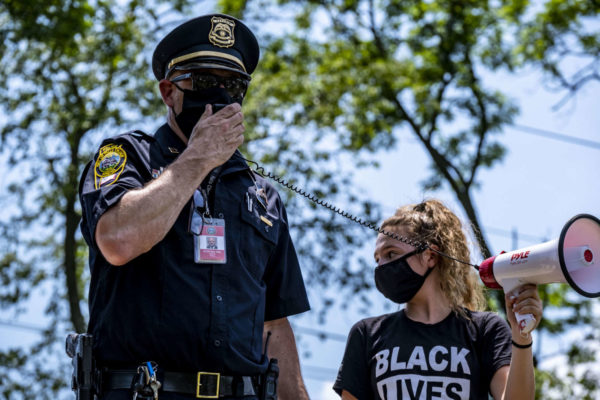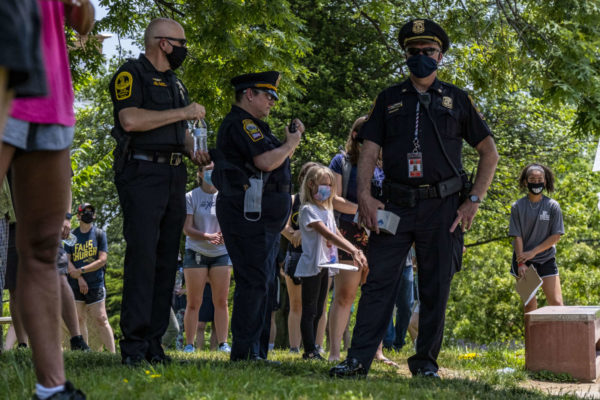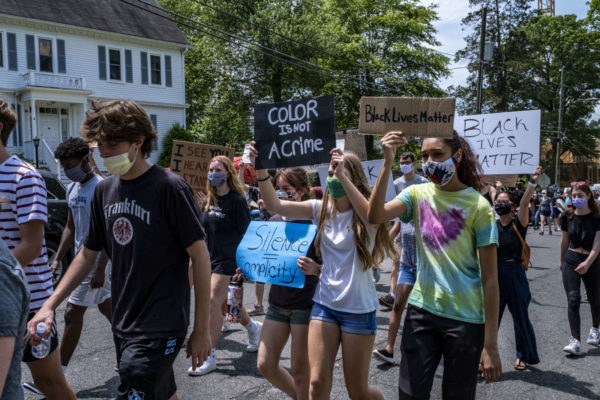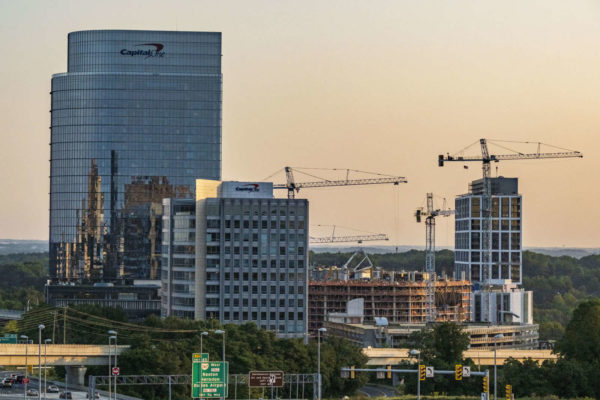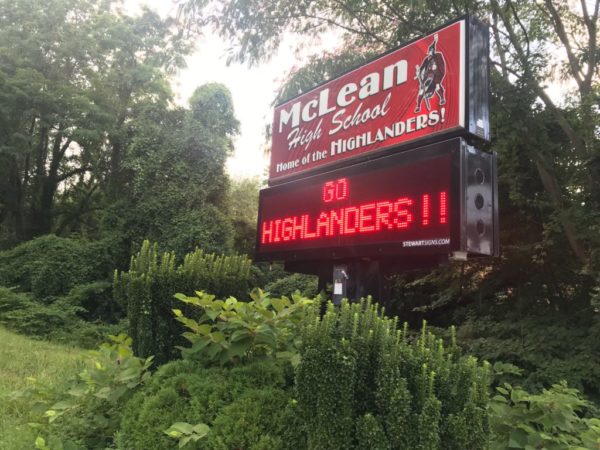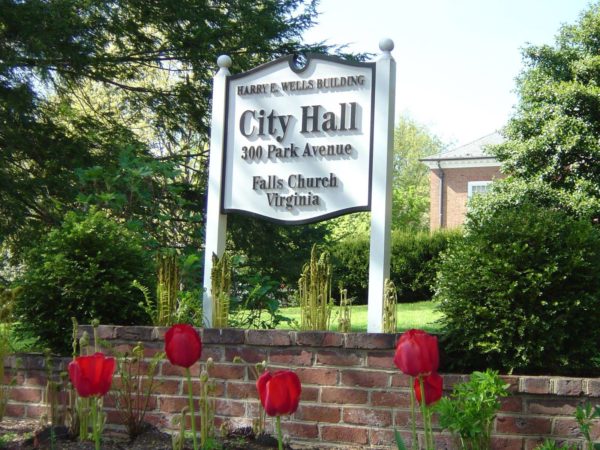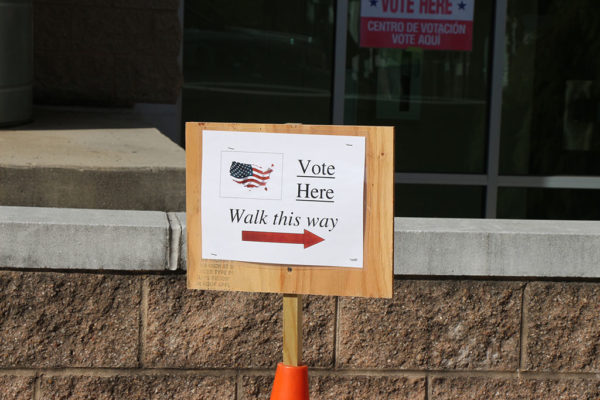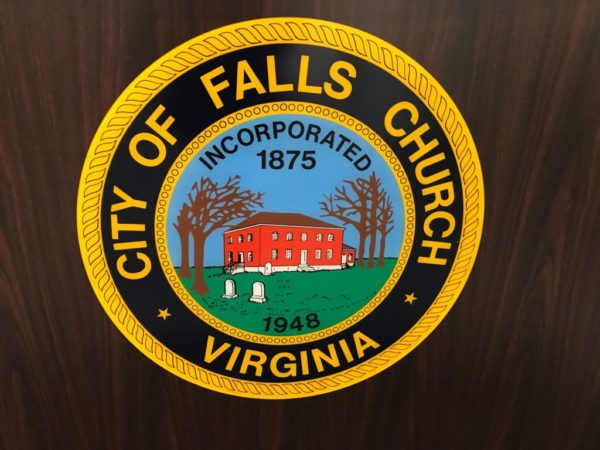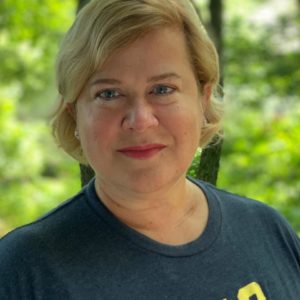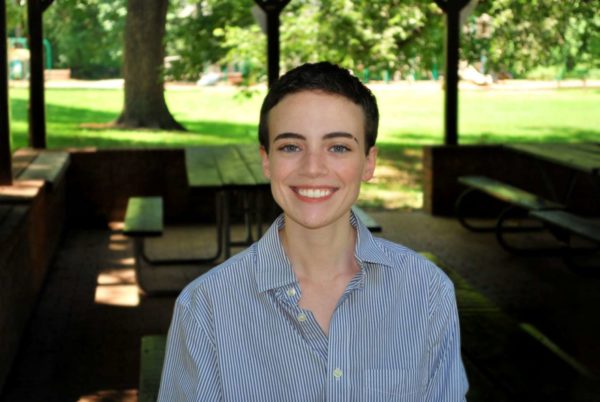The Falls Church Use of Force Review Committee is nearly done compiling experiences and reviews of policies and investigations for a report on how police officers and sheriffs utilize force in their work.
The report is slated to go before the Falls Church City Council on Feb. 22 and will address the committee’s findings from pouring over 113 reports of uses of force by local law enforcement, nearly 400 community responses to a survey about experiences with officers, and the department’s policies governing the use of force.
It will also include 10 recommendations, ranging from procedural changes to community engagement.
The committee reviewed the results from the community survey, which drew 393 responses, last night (Wednesday).
“We would have loved to receive comments from every last citizen within the City of Falls Church,” Committee Chair Janis Johnson said during the meeting. “We did not, so we do appreciate those folks who were able to take time out to respond. It does inform the committee’s work and helps us validate some of our recommendations and discussions.”
The most-represented respondents were white women between the ages of 35 and 64, and 111 respondents identified as non-white or withheld their demographic information.
Committee vice chair Brian Creswick said the number of responses was encouraging, and neither the demographic percentages nor the distribution of answers surprised him. Broadly, he said the results of the survey mirror what the committee has found after reviewing policies and use of force reports.
“There was a generally positive view [of law enforcement],” he said. “I think there was a slightly more negative view among minority populations. I don’t want to editorialize whether it was significant or not — the numbers showed a decrease.”
Across the board, more than 96% of respondents said they had not experienced force by the Falls Church Police Department or sheriff’s department. Nearly 90% of respondents reported never seeing law enforcement use force, but among people of color and people who did not specify race — two groups that were combined in the committee’s data breakdown — the share was lower at around 77%.
About 10% of people of color/people who did not specify race said the police or deputies they interacted with displayed poor or very poor levels of professionalism. That was twice as high as when white people were included in the overall rate.
Around 85% of respondents said the police department and sheriff’s office keep the city safe. About 81% of people of color/unspecified race shared that sentiment.
Although nearly 400 people responded, the survey yielded 858 comments, which will be included in the report.
Some comments after the survey indicated feelings toward law enforcement that were not captured by the questionnaire responses. Committee members said the comments indicate some people of color feel targeted by law enforcement and perceive a sense of arrogance among officers.
Public representative Raymond Touomou cautioned against only looking at what the majority said because this group is “overwhelmingly white.”
“One of the best ways is to look at what the minorities think happened to them,” he said. “When I read the results, there were some things that are alarming, and transcend statistical significance…such as kids who report being harassed on their way to and from school.”
Public representative Toni Lewis said the group was intentional about reaching out to minority communities. Although she phoned apartment complexes and churches, she said that “as in many surveys and initiatives, we ran into the problem of engaging the usual suspects.”
“I’ll own that we could have made this better marketed,” she said.
Falls Church established the committee on June 12 after recent deaths of Black men and women at the hands of police, including George Floyd, Breonna Taylor, and Ahmaud Arbery, fueled calls for action on racial justice issues.
The committee was set to go before the city council in December but requested an extension so it would have enough time to collect data and debrief the results of the city-wide survey with the community.
Staff photo by Jay Westcott
Following a months-long review, the City of Falls Church Use of Force Review Committee is slated to recommend police reforms by February 2021 after the city council granted the committee an extension on Monday (Dec. 14).
Originally, the committee was set to disband after it presented its report to the Falls Church City police chief, city manager and city council at the end of December. That deadline has now been changed to Feb. 28, 2021.
The report will cover the committee’s discoveries from pouring over 113 reports of uses of force by local law enforcement, nearly 400 community responses to a survey about experiences with the police, and the department’s policies governing the use of force. It will also include a variety of recommendations, ranging from procedural changes to community engagement.
The 133 documented uses of force in the city since 2015 comes with a few caveats. At least 25 of the reports involve animals, since the Falls Church City Police Department’s definition of “uses of force” includes animal euthanasia, Use of Force Review Committee Vice Chair Brian Creswick said.
“Matching policy and procedure with practice, that is where the rubber meets the road…that’s where problems arise,” said Falls Church City Human Resources Director Steve Mason, who is the staff representative to the committee.
Falls Church established the committee on June 12 after recent deaths of Black men and women at the hands of police, including George Floyd, Breonna Taylor, and Ahmaud Arbery, fueled calls for action on racial justice issues.
The committee received 72 online applications, along with some mail applications. That is more than any other in the city’s history, Mason said.
The committee is part of the city council’s commitment to the Reimagining Policing Pledge, which urges mayors and local officials to review and reform use-of-force policies over the course of 90 days.
In Virginia, Alexandria, Vienna, Dumfries, Richmond and Winchester have also formed similar committees. Creswick commended Falls Church for being part of the small group.
“We could’ve taken the easy road out because these things weren’t happening here,” he said. “We have a city council and a government that is really trying to make the city welcoming and inclusive.”
The committee consists of seven community members and six government officials, an intentional ratio to avoid the city government “controlling the narrative by sheer numbers,” Mason said. There are four Black people on the committee, and six women, representing a range of professional experiences, from social services to law.
“The seven community members selected are second to none and really added great expertise to this committee,” Mason said.
To learn about the community’s experiences with the police, the committee sent out a survey from mid-November through Dec. 4, though Johnson admits it was hard to engage people that would typically not answer a survey.
Respondents were asked, but not required to provide, demographic information, and the results indicate white women are the primary group to respond to surveys, Creswick said. Still, some respondents reported experiences that the committee is looking into more thoroughly.
Taken together, the committee’s survey, procedural review, and review of use-of-force reports will give people a “rich understanding of where there’s opportunities to improve,” according to Creswick.
Despite the adversarial tenor to national discussions on police reform, Creswick says the committee’s work here has been collaborative. Committee Chair Janis Johnson hopes the committee will help keep attention on police reform even when it isn’t dominating national headlines.
“The reasoning behind these committees and reviews is so that this stays on people’s minds, and there is change that lasts,” she said.
Tysons Partnership Celebrates Tysons Corner Metro Station Renaming — “This is an important step forward in the effort to unify the Tysons brand and foster a cohesive sense of place across our rapidly urbanizing neighborhoods…The new station name reflects our new urban, transit-oriented reality.” [Tysons Partnership]
Post Office Collection Box Thefts Reported in Vienna — “The incidents impacted collection boxes at Church Street and Lawyers Road, which is near the Vienna U.S. Postal Service location at 200 Lawyers Road NW. According to the police department, the most recent incident occurred overnight on Nov. 22 to 23.” [Patch]
Falls Church City Councilmember Participates in Vaccine Trial — “Falls Church City Council member David Snyder, who has served on the Council since 1994, announced last week that he participated in a trial of the Moderna Covid-19 vaccine.” [Falls Church News-Press]
Tysons-based Alarm.com Concludes Virginia’s First Tech Apprenticeship Program — “Alarm.com recently wrapped up the first state-sponsored apprenticeship program for a tech company in Virginia. It included 10 weeks of technical instruction at Northern Virginia Community College, and nine months of on-the-job training.” [WTOP]
Former Town of Vienna Mayor’s Home Spared for Now — “A sprawling home previously owned by a late former Vienna Mayor Charles Robinson Jr. and his wife, late former Town Council member Maud Robinson, will not be demolished just yet. The Vienna Town Council unanimously agreed Nov. 16 to postpone until Dec. 7 its decision on a contract to raze the home.” [Sun Gazette]
Falls Church’s PAE Inc. Buys Up Intelligence Services Provider — “The Falls Church defense contractor will acquire Arlington-based intelligence services provider Metis Solutions LLC for $92 million in an all-cash deal, executives from PAE said Monday.” [Washington Business Journal]
McLean High School Students Named Finalists for Journalism Awards — “Student journalists who work on McLean High’s The Highlander news publication have been named finalists in several 2020 National Scholastic Press Association individual awards categories. Being named a finalist in any of these categories means these student journalists are among the top 10 in the nation.” [Fairfax County Public Schools]
Falls Church City School Board Veteran Dies at 87 — “In his adopted home of Falls Church, Jerry [Barrett] served for eight years each on the boards of the local school system and Northern Virginia Community College.” [Falls Church News-Press]
The City of Falls Church wants to expand its stock of affordable housing, but exactly how it should achieve that remains up for debate.
One option currently under consideration is updating the zoning ordinance’s special exception section, which has become a reliable tool for encouraging mixed-use development.
Under a preliminary proposal presented to the Falls Church City Council on Monday (Nov. 16), the criteria for evaluating possible development projects would be amended to incentivize the inclusion of affordable housing units, allow for smaller structures, and better reflect the current state of the commercial real estate market.
“With the economy changing and obviously the future of work and commercial space probably looking pretty different, I do think it’s time for us to modernize this,” City Councilmember Letti Hardy said. “…I know this is something that’s really important to the city and not something we want to take lightly.”
The special exception provisions in Falls Church’s zoning code permit mixed-use development and taller building heights than what is otherwise allowed in underdeveloped commercial areas that the city identified as sites that could be revitalized in its 2005 Comprehensive Plan.
The so-called Planning Opportunity Areas, including downtown Falls Church and West Broad Street, were officially designated as revitalization districts in 2016.
To qualify for consideration under the special exception provision, development proposals must be consistent with the city’s comprehensive plan, show a significant net increase in the site’s new commercial square footage, and generate positive net new commercial and residential revenue.
Developers can get an exemption from the latter two criteria if at least 75% of the residential units in their project qualify as affordable housing.
The special exception provision has facilitated the completion of 10 mixed-use projects in Falls Church since 2003, all but one of which have brought in revenue for the city. Four more are now in the works, including Founders Row, the West Falls Church redevelopment, and the Broad and Washington project.
However, there have also been projects that fell through because they were unable to meet the code’s criteria without adding height and density that drew objections from surrounding neighborhoods.
Falls Church Planning Director Paul Stoddard says a proposed development at Tradition Place collapsed in 2016 after the developer started making the building taller to compensate for the net commercial square footage requirements and concessions to the city that were under discussion.
A Park & Lee development application submitted in 2017 failed to obtain approval after facing similar obstacles.
“Because there was some existing commercial [area] on the property, they were not able to meet that net increase in commercial in order to get through without making the project more dense, which was an issue for the community surrounding it,” Falls Church City Senior Planner Shaina Schaffer said.
In addition, none of the special exception projects approved by the city have met the threshold of 75% affordable housing needed to forgo the requirement for adding commercial space, which is less in demand now, especially for traditional office and retail uses.
To address these issues, the Falls Church planning staff is recommending that the city council amend the zoning ordinance so that projects only have to provide new commercial space, rather than adding to the existing square footage. They also say the 75% affordable housing threshold should be reviewed to see if it should be lowered to be more feasible.
Councilmember Debora Hiscott suggested that city staff should reach out to contacts in the developer community to get a sense of what percentage of affordable housing would be palatable for them.
“If we want to know what will bring [affordable housing] in, I think who better to ask than the people who’d be bringing it in?” Hiscott said. “Then we can make decisions from there whether it’s palatable for our community, whether it meets our goals, and brings in that revenue.”
Photo via City of Falls Church Government/Facebook
After long lines for early voting, Election Date is finally here. so far, the county has unofficially reported more than 399,600 votes cast. County officials say this is 70 percent of the total votes cast in the 2016 presidential election and 50 percent of registered county voters have already cast their ballots. Here’s a breakdown of what you need to know before you head to the polls today.
Casting Your Ballot
All polling places will be open from 6 a.m. to 7 p.m. throughout Fairfax County. An acceptable form of identification is required. Voters are encouraged to wear masks or face coverings and remain socially distanced using markers placed outside polling places to help voters stand six feet apart. Note that several Fairfax County Park Authority polling sites will be open only to voters today, including the Spring Hill RECenter in McLean and the Oak Marr RECenter in Oakton.
Voters can return mail-in ballots at a ballot drop-off box, which will be available at every polling place today (Tuesday). A 24-hour box outside the Fairfax County Government Center will be available until 7 p.m. Ballots returned by mail must be postmarked by Nov. 3. If you plan to use a drop-off box, make sure the “B” envelope is inside your returning mail envelope. Further instructions, which will help the county process ballots faster, are available on the county’s website.
What’s On Your Ballot
The following is a breakdown of what to expect on your ballot. Sample ballots are available online.
President and Vice President
- Joseph R. Biden, President and Kamala D. Harris, Vice President: Democrat
- Donald J. Trump, President and Michael R. Pence, Vice President – Republican
- Jo Jorgensen, President and Jeremy F. “Spike” Cohen, Vice President – Libertarian
Member, United States Senate
- Mark R. Warner – Democrat
- Daniel M. Gade – Republican
Member House of Representatives, 11th District
- Gerry E. “Gerry” Connolly – Democrat
- Manga A. Anantatmula – Republican
The City of Fairfax
City residents will vote in a special election to fill one seat on the city council that was vacated when longtime Councilmember Daniel Sze died from cancer in July. Tysons Reporter interviewed each of the three candidates vying for the council seat:
Constitutional Amendments
Amendment #1 proposes creating a redistricting commission with eight General Assembly members and eight state citizens to draw congressional and state legislative districts. The General Assembly would vote on the new maps without proposing any changes. If the commission fails to draw districts or the General Assembly fails to enact districts by set deadlines, the responsibility of drawing districts would fall on the Supreme Court of Virginia.
Amendment #2 is written as follows: Should an automobile or pickup truck that is owned and used primarily by or for a veteran of the United States armed forces or the Virginia National Guard who has a one hundred percent service-connected, permanent, and total disability be free from state and local taxation?
Bond Questions
Public libraries: Shall Fairfax County, Virginia, contract a debt, borrow money, and issue bonds in addition to the public library facilities bonds previously authorized, in the maximum aggregate principal amount of $90,000,000 for the purpose of providing funds, with any other available funds, to finance the cost to provide public library facilities, including the construction, reconstruction, enlargement, and equipment of existing and additional library facilities and the acquisition of necessary land?
Transportation bonds: Shall Fairfax County, Virginia, contract a debt, borrow money, and issue bonds, in addition to the transportation improvements and facilities bonds previously authorized, in the maximum aggregate principal amount of $160,000,000 for the purpose of financing Fairfax County’s share, under the Washington Metropolitan Area Transit Authority Compact, of the cost of constructing, reconstructing, improving, and acquiring transportation improvements and facilities, including capital costs of land, transit facilities, rolling stock, and equipment in the Washington metropolitan area?
Community health and human services bonds: Shall Fairfax County, Virginia, contract a debt, borrow money, and issue bonds, in addition to the human services facilities bonds previously authorized, in the maximum aggregate principal amount of $79,000,000 for the purpose of providing funds, with any other available funds, to finance the cost to provide community health and human services facilities, including the construction, reconstruction, enlargement, and equipment of existing and additional community health and human services facilities and the acquisition of necessary land?
Parks and parks facilities bonds: Shall Fairfax County, Virginia, contract a debt, borrow money, and issue bonds, in addition to the parks and park facilities bonds previously authorized, in the maximum aggregate principal amount of $112,000,000 for the following purposes: (i) $100,000,000 principal amount to finance the Fairfax County Park Authority’s cost to acquire, construct, reconstruct, develop, and equip additional parks and park facilities, to preserve open-space land, and to develop and improve existing parks and park facilities; and (ii) $12,000,000 principal amount to finance Fairfax County’s contribution to the Northern Virginia Regional Park Authority to acquire, construct, reconstruct, develop, and equip parks and park facilities?
Other Items of Note
Voters should call the Fairfax County Police Department’s non-emergency number at 703-691-2131 to report any disruptions to voting. The following activities are prohibited by state law:
- Loitering, campaigning or congregating within 40 feet of a polling place’s entrance
- Using a loudspeaker within 300 feet of a polling place
- Falsely assuming or exercising the powers, duties or functions of any county, city, state, or federal law-enforcement officer.
Results will be available on the Virginia Department of Elections’ website. Absentee ballots may be accepted until noon on Friday, Nov. 6.
In a work session discussion yesterday, the Falls Church City Council considered a new distribution of funds in the FY 2021 budget to help cover issues ranging from COVID response to stormwater management.
One of the most immediate concerns presented in the budget discussion was the appropriation of $547,000 from CARES Act funding allocated to the city to help address crises in the city. The lion’s share of the funding, $250,000, was set to be allocated as small business grants, followed by $150,000 in emergency assistance to residents to help cover rental, utility and food assistance.
The City Council also considered funding for six stormwater management projects planned to help prevent some of the flooding issues that have devastated homes in the area over the last few years. There was some concern on the council, however, that without proper consideration the funding could just be flushing money down the drain.
Ross Litkenhous, a Falls Church City Council member, emphasized that he was in favor of dedicating funding to fixing flooding problems, but was concerned that the proposed projects were temporary fixes that would do little to address longer-term problems.
“I refuse to go down a path where we’re only solving for half the problem,” Litkenhous said.
Others on the Council urged to move forward with planning for stormwater management, though with general fund rather than issuance of debt.
Amid the discussion of spending, Vice Mayor Marybeth Connelly suggested that some funding be set aside in reserve. While the city is facing a fiscal catastrophe, experts warn the region could face difficult years ahead where they might need to tap into a cash reserve.
“Next year’s budget is going to be a big challenge,” Connelly warned.
In a meeting about how to help build affordable housing in Falls Church, one potential solution proposed was increasing the meals tax by 1%.
Meals tax increases have been a go-to solution for finding more funding for affordable housing in neighboring jurisdictions like Arlington County. Meals tax increases are frequently contentious even in the best of times, but the Falls Church City Council noted that these are far from the best of times.
Representatives from the hired consultants National Housing Trust and Federal City Council offered 11 recommendations in what they described as a tool box in a City Council work session on Monday. A meals tax was only one of those suggestions, but one most likely to turn heads, as restaurants in the area face devastating losses in revenue.
The consultants argued that increasing the meals tax by 1%, from 4% to 5%, would bring Falls Church in line with the meals tax in other parts of the region and would generate $800,000 for the affordable housing fund annually.
According to the report:
A meals tax is levied on prepared food purchased for consumption at a restaurant or taken to-go. Falls Church already has a meals tax of 4%, which generated over $3 million in revenue annually from 2017-2019 . Currently, all the funds generated by the meals tax are directed into the City’s General Fund. To provide a dedicated and consistent revenue source for the Affordable Housing Fund, Falls Church should consider increasing the Meals Tax to 5%, dedicating the additional 1% in tax revenue to the Affordable Housing Fund. This would represent a much-needed consistent revenue source for the AHF and would generate approximately $800,000 annually for the Fund.
A 5% meals tax is in line with what is levied by other jurisdictions in the area. In the Commonwealth of Virginia, the median meals tax rate is 6%. While neighboring jurisdictions Arlington and Fairfax County currently levy a 4% meals tax, as of 2016, 108 localities in the Commonwealth have instituted a meals tax that is higher than 4%.
The report notes that Alexandria’s meals tax increase was aimed squarely at raising funding for affordable housing, though the report also acknowledged that recent factors could make the proposal untenable in the near term.
The consultants recognize that restaurants nationwide are struggling to survive on reduced revenue caused by COVID-19, and the subsequent limits and restrictions on service that have been imposed to stop the spread of the virus. An increase in the tax at this time could potentially discourage the purchase of food from restaurants at a time when restaurants are operating on extremely thin margins. The implementation of this recommendation should be considered in the long-term, once the restaurant and hospitality industry is under less financial pressure.
City Council member Letty Hardi struck down the idea as soon as the discussion was turned back over to the City Council.
“In regular times I’d be a fan of looking at things like the meals tax or carving funding out of the general fund,” Hardi said, “but I think neither of those would fly currently given how much suffering there is in the community.”
One proposed source of funding that sat better with the City Council was dipping into Amazon REACH Funds — a $75 million funding commitment to support affordable housing in the area and avoid the affordable housing loss associated with the tech giant elsewhere.
“The City of Falls Church should take the opportunity to engage with local housing development owners whose projects are eligible and are able to access the funds to increase housing affordability in the City,” the report said. “The final deadline for a project application is June 15, 2021.”
Maura Brophy, director of transportation and infrastructure for Federal City Council, also said that promoting accessory dwelling units can have a meaningful impact on housing affordability by increasing the supply, but without other interventions and requirements, there’s no guarantee that the accessory dwelling units would be affordable.
“If we can access all $3 million, that will allow us to buy down 60 units for about ten years, and that’s way more than we can produce in a year as-is,” Hardi said. “That feels like we should put pedal to the meddle and go after that free money.”
Editor’s Note — Tysons Reporter is running Q&As with the candidates running for the open Falls Church City Council seat. The stories have been condensed and edited for clarity.
Debora Schantz-Hiscott is one of three candidates — along with Joshua Shokoor and Simone Pass Tucker — running for the open Falls Church City Council seat on the Nov. 3 election.
Tysons Reporter: Why did you decide to run?
Schantz-Hiscott: I have lived in Falls Church City for 24 years. I have raised three children here. I’ve been extensively involved in the community with the women’s commission, with the schools, with athletics, with all kinds of organizations, and I have been thinking about running for city council for many years.
However, I decided I would do it once my youngest child graduated from high school, which is next June. I was thinking about running for [the] November 2021 city council to kind of build upon the 24 years of volunteerism and working, and raising a family and building a community here. With the very unfortunate passing of Councilman Dan Sze, this special election is being held. I decided I would shorten that timeline and run for this year’s special election on November 3.
Tysons Reporter: How are you connected to the Falls Church community?
Schantz-Hiscott: For the past eight years, I’ve served with the Falls Church Education Foundation’s executive director. I’ve been for almost all of that time a sole employee and have taken a standalone 501(c)(3) foundation at the Falls Church City Public Schools into a thriving organization with a volunteer board of 16 people that has raised almost $2 million for supporting programs and grants and scholarships within Falls Church City Public Schools.
I’ve worked extensively for the past eight years with businesses to collaborate with them to see how supporting the foundation benefits their businesses…which work extensively with the school, the superintendent, and the school administration to see what current needs are in our city.
I’ve worked with city staff across a dozen different departments to put together events…and then with school staff to create these events, to create fundraisers and to create support for the school. Support for the schools includes creating a grant program. Last year, we gave about $260,000 out for innovation grants, and those can be anything from additional programs at the preschool all the way through.
We have also supported teacher training. So, above and beyond what our school board can and city can afford to do within professional development, we’ve supported staff on everything from…leadership courses to reading, math, science — you name it — for the teachers and the community.
And then lastly, and probably most importantly, supporting equity of access for our community: equity to educational resources, equity to food security, technology, clothing, emergency services, etc. I work really closely with the social workers. There’s one assigned to each school to identify what needs we have, and in the past year, since the pandemic, we — just in the spring alone — gave about $120,000 out in food support, in addition to clothing and everything. You can kind of see that my job and my life are kind of intertwined. Read More
Editor’s Note — Tysons Reporter is running Q&As with the candidates running for the open Falls Church City Council seat. The stories have been condensed and edited for clarity.
Simone Pass Tucker is one of three candidates — along with Joshua Shokoor and Debora Schantz-Hiscott — running for the Falls Church City Council’s open seat in the upcoming Nov. 3 election. A 2016 graduate of George Mason High School, Tucker runs the candle shop Lavender Mensch Candles out of their home. If elected, they would become the first openly non-binary person to take office in Virginia history.
Tysons Reporter: Why did you decide to run for the Falls Church City Council?
Tucker: I have lived in Falls Church my whole life. I grew up being pretty involved in the local community and in politics. In 2008 and 2012, my parents took me door-to-door campaigning for Barack Obama, and I’ve dedicated my adult life to leadership, volunteering, and civic engagement. At North Carolina State University, and then William & Mary once I transferred, I became involved in progressive activism focused on things like reproductive justice, racial equity, the Israeli-Palestinian conflict, and climate change.
So, I have a history in activism and advocacy work. I came back to Falls Church City with a mission after college to make a Falls Church that is more eco-friendly, more compassionate, more equitable, more just, and more livable for everyone who lives here. I am a non-binary Jewish person, and so, I know what it is like to feel unrepresented by government, and I don’t want anyone else to have to feel that way, so I’m running to be a voice for our marginalized communities, to make sure that everyone’s voice is heard, and really, to bring a fresh perspective to our city council.
Tysons Reporter: For progressive issues like racial justice and environmental justice, why do you think those issues are important for the city to think about?
Tucker: In terms of racial equity, stated support of groups like Black Lives Matter is a great start. You know, Falls Church has a pretty racist past as a city, so we need to pledge to do better through concrete action and policy. In 1887, most of the black neighborhoods in Falls Church City were gerrymandered out, and we passed a local segregation ordinance in 1915 that wasn’t repealed until 1999, and we’re still largely divided actually along that same red line on Route 29.
To address these issues, as a member of city council, I’ll fight to establish dedicated city housing for people who work in Falls Church; purchase, preserve, and prolong the affordable housing units set to expire; fund housing vouchers; end restrictive, racist single-family homes zoning laws; establish public housing; [and] require the usage of body cameras for all police officers. As of right now, actually, we don’t even require our dash cameras to be operated at all times. I’ll bring unrepresented voices to the table by asking them directly what they need from local government. We don’t have a ton of citizen outreach like that at the moment, but it is extremely important to make sure everyone’s involved.
In terms of environmentalism, climate change is going to be costing billions of dollars and even more lives, so it’s really important nationally and internationally, but also at the local level, that we take action now before it’s too late. So, I am lucky enough to be endorsed by a few Virginia Sunrise Movement hubs — Sunrise McLean and Sunrise Williamsburg — and I am a passionate believer in the Green New Deal. The Green New Deal does have a national scope, but there are tons of ways to focus on enacting it at a local level. We focus on our carbon footprint, and we need to implement green energy in all of our government buildings and work towards requiring this in all incoming developments.
I also believe that…adding more green space, more permeable land is really important for Falls Church specifically, because we have a rapidly expanding floodplain, and our stormwater runoff issues are just steadily growing worse. I also think it’s important that we have proportional stormwater management fees and need to rethink how we’re approaching stormwater management. We don’t want to be having pipes that are just redirecting that stormwater. We want to make sure that we’re absorbing it so that it isn’t just causing a problem somewhere else. We don’t want to reroute the problem, we want to solve it. Read More


